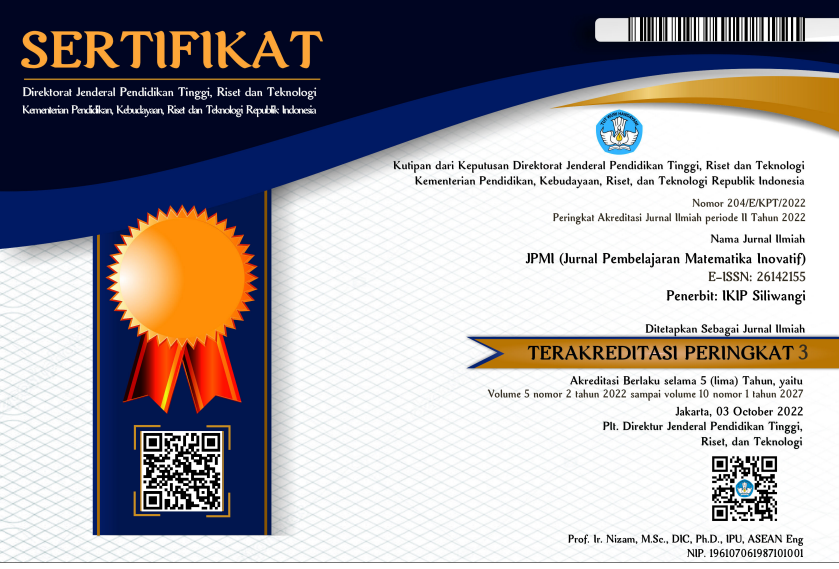Mengaplikasikan bahan ajar berbantuan powerpoint terhadap kemampuan pemecahan masalah matematis siswa
DOI:
https://doi.org/10.22460/jpmi.v6i5.20012Keywords:
Mathematics Problem Solving, Mathematics Problem Solving Social ArithmeticsAbstract
Problem solving abilities play an important role in solving mathematical problems. Problem solving indicators consist of 4 (four), namely: (1) understanding the problem (2) preparing a settlement plan (3) carrying out problem solving (4) re-examining the results of the work. The purpose of this study was to analyze the mathematical problem solving abilities of students on junior high school social arithmetic material. The method used in this research is descriptive qualitative. The research subjects were class VIII students of SMPN 4 Cibinong, totaling 10 people and the research was conducted at SMPN 4 Cibinong. The instrument used in this study was a test about the description of mathematical problem solving abilities of 5 questions. The results of this study are the level of students' problem solving abilities on troubleshooting step 2, 3, and 4 with social arithmetic material which is still relatively low. This data is obtained from the results of the problem-solving ability test according to the indicators.
References
Hutauruk, A. J., & Panjaitan, S. M. (2020). Penguasaan materi matematika sekolah dan permasalahannya pada mahasiswa prodi pendidikan matematika. JPMI (Jurnal Pembelajaran Matematika Inovatif), 3(1), 81–90. https://doi.org/https://doi.org/10.22460/jpmi.v3i1.p81-90
Karaçam, S., & Baran, A. D. (2015). The effects of field dependent/field independent cognitive styles and motivational styles on students’ conceptual understanding about direct current circuits. Asia-Pacific Forum on Science Learning and Teaching, 16(2), 1–19. https://eric.ed.gov/?id=EJ1096071
Mardiana, E. (2018). Pengembangan bahan ajar berbasis pendekatan saintifik meningkatkan kemampuan literasi matematika siswa. Prisma, Prosiding Seminar Nasional Matematika, 1, 87–91. https://journal.unnes.ac.id/sju/index.php/prisma/
Ngilawajan, D. A. (2013). Proses berpikir siswa SMA dalam memecahkan masalah matematika materi turunan ditinjau dari gaya kognitif field independent dan field dependent. PEDAGOGIA: Jurnal Pendidikan, 2(1), 71–83. https://doi.org/https://doi.org/10.21070/pedagogia.v2i1.48
Nurlaili. (2018). Al Fitrah. Sumber belajar dan alat permainan untuk pendidikan anak usia dini, 2(1), 229–241. http://ejournal.iainbengkulu.ac.id/index.php/alfitrah
Özreçberoğlu, N., & Çağanağa, Ç. K. (2018). Making it count: Strategies for improving problem-solving skills in mathematics for students and teachers’ classroom management. Eurasia Journal of Mathematics, Science and Technology Education, 14(4), 1253–1261. https://doi.org/https://doi.org/10.29333/ejmste/82536
Priya, J. J. (2017). Mathematical problem solving ability of eleventh standard students. Journal on Educational Psychology, 11(2), 36–44. https://eric.ed.gov/?id=EJ1169548
Puspananda, D. R., & Suriyah, P. (2017). Analisis faktor pada group embbeded figures test untuk mengukur gaya kognitif. Prosiding Seminar Nasional Matematika Dan Pendidikan Matematika UNY, 225–230. http://seminar.uny.ac.id/semnasmatematika/sites/se.
Rahman, M. (2019). 21 st century skill “ problem solving ”: defining the concept. Journal Of Interdisciplinary Research, 2(1). https://doi.org/10.34256/ajir1917
Ramadhani, R. (2018). The enhancement of mathematical problem solving ability and self-confidence of students through problem based learning. Jurnal Riset Pendidikan Matematika, 5(1), 127–134. https://doi.org/https://doi.org/10.21831/jrpm.v5i1.13269
Razak, F., & Sutrisno, A. B. (2017). Analisis tingkat berpikir siswa berdasarkan teori van hiele pada materi dimensi tiga ditinjau dari gaya kognitif field dependent. Edumatica, 07, 22–29. https://doi.org/https://doi.org/10.22437/edumatica.v7i02.4214
Sari, A. R., & Aripin, U. (2018). Analisis kesalahan siswa dalam menyelesaikan soal cerita bangun datar segiempat ditinjau dari kemampuan pemecahan masalah matematik untuk siswa kelas VII. JPMI (Jurnal Pembelajaran Matematika Inovatif), 1(6), 1135–1142. https://doi.org/https://doi.org/10.22460/jpmi.v1i6.p1135-1142
Simamora, R. E., & Saragih, S. (2019). Improving students’ mathematical problem solving ability and self-efficacy through guided discovery learning in local culture context. International Electronic Journal of Mathematics Education, 14(1), 61–72. https://doi.org/https://doi.org/10.12973/iejme/3966
Son, A. L., Fatimah, S., & Darhim. (2019). An analysis to student error of algebraic problem solving based on polya and newman theory. Journal of Physics: Conference Series, 1315(1), 12069. https://doi.org/https://doi.org/10.1088/1742-6596/1315/1/012069
Sudirman. (2021). Pinisi: journal of teacher professional. 2(April), 49–56. https://ojs.unm.ac.id/TPJ
Sulistyani, D., Subekti, E. E., & Wardana, M. Y. S. (2021). Students’ learning difficulties review from mathematics problem-solving ability in third-grade elementary school. Indonesian Journal Of Educational Research and Review, 04(2), 345–351. https://doi.org/https://doi.org/10.23887/ijerr.v4i2.30310
Surya, E., & Putri, F. A. (2017). Improving mathematical problem-solving ability and self-confidence of high school students through contextual learning model. Journal on Mathematics Education, 8(1), 85–94. https://doi.org/https://doi.org/10.22342/jme.8.1.3324.85-94
Yati, R. (2015). Permasalahan krisis pendidikan karakter pada siswa dalam perspektif psikologi pendidikan. 2504, 1–9. https://www.academia.edu/35692180/Guru_efektif_dalam_perspektif_psikologi_pendidikan
Downloads
Published
Issue
Section
License

This work is licensed under a Creative Commons Attribution-ShareAlike 4.0 International License.
The author is responsible for acquiring the permission(s) to reproduce any copyrighted figures, tables, data, or text that are being used in the submitted paper. Authors should note that text quotations of more than 250 words from a published or copyrighted work will require grant of permission from the original publisher to reprint. The written permission letter(s) must be submitted together with the manuscript.
















